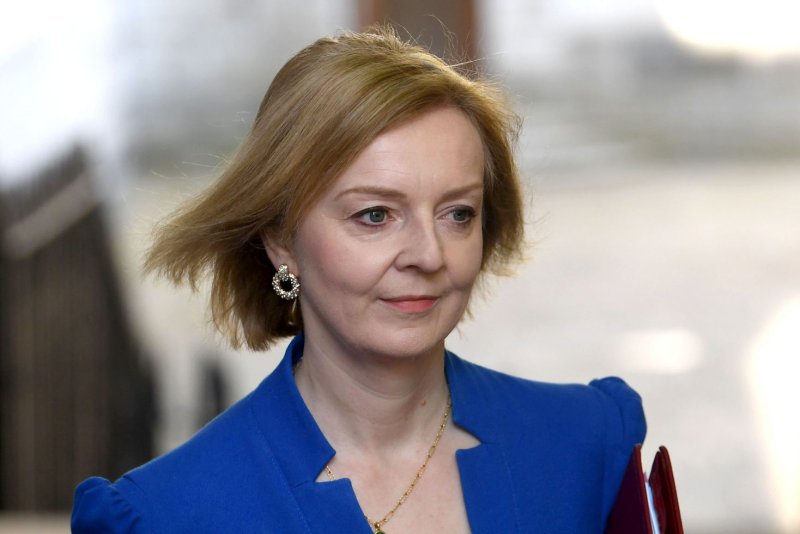British Foreign Secretary Liz Truss said the Northern Ireland Protocol Bill is necessary to "protect the supremacy" of British courts and to protect the country's "territorial integrity." File Photo by Neil Hall/EPA-EFE
June 13 (UPI) -- The British government on Monday filed a controversial bill that if enacted would unilaterally override a section of its Brexit agreement with the European Union regarding Northern Ireland.
The measure, known as the Northern Ireland Protocol Bill, was submitted by British Foreign Secretary Liz Truss, who asserted it is "necessary to end the untenable situation where people in Northern Ireland are treated differently to the rest of the United Kingdom, protect the supremacy of our courts and our territorial integrity."
"This is a reasonable, practical solution to the problems facing Northern Ireland," she said in a statement. "It will safeguard the EU Single Market and ensure there is no hard border on the island of Ireland."
The European Union, however, said the move to unilaterally change the way Northern Ireland is treated under the provisions of the mutually negotiated Brexit withdrawal agreement is a violation of international law and risks igniting a costly trade war.
"It is with significant concern that we take note of today's decision by the U.K. government to table legislation disapplying core elements of the protocol," European Commission Vice President Vice President Maros Sefcovic said in statement. "Unilateral action is damaging to mutual trust."
He warned Brussels would launch legal action for infringing the protocol, beginning with the resumption of an "infringement procedure" first filed against the British government last year and later put on hold as the two sides attempted to negotiate changes to the protocol.
"The U.K.'s unilateral action goes directly against this spirit," Sefcovic said.
The British government under Prime Minister Boris Johnson agreed to the Northern Ireland Protocol as part of its Brexit withdrawal deal. It is aimed at keeping the land border open between Northern Ireland in the United Kingdom and Ireland in the European Union.
The 1998 Northern Ireland peace deal between the two countries established the open border, which worked because both belonged to the European Union at the time, so there was no need for checks on trade and goods traveling across the border.
But after the United Kingdom exited the EU, those borders became trickier. The EU requires many goods from non-EU countries to be inspected before crossing the border and prohibits some goods altogether.
In order to maintain a lack of checks on the Irish-Northern Irish border, the protocol mandates those checks be conducted when items are transported to Northern Ireland from England, Scotland or Wales.
Critics, including pro-Brexit Conservative Party lawmakers and Northern Irish unionists, claim this has effectively created a new border between Northern Ireland and the rest of the United Kingdom.
Johnson has said the protocol bill represents only a minor tweaking and Truss told members of Parliament Monday the government is "acting within international law," insisting "we are changing the Northern Ireland Protocol, not getting rid of it."
As legal justification, the government cites "Article 16," a clause that allows either side to take "safeguarding measures" if they are deemed "necessary" to protect either of the parties' essential interests.
But Brussels says the changes sought by Britain amount to a renegotiation of the entire agreement.
"Renegotiating the protocol is unrealistic," Sefcovic said. "No workable alternative solution has been found to this delicate, long-negotiated balance. Any renegotiation would simply bring further legal uncertainty for people and businesses in Northern Ireland. For these reasons, the European Union will not renegotiate the protocol."















